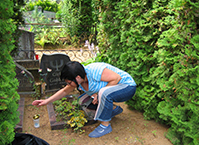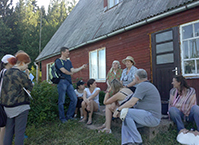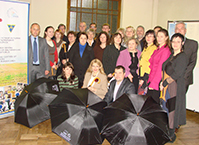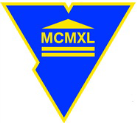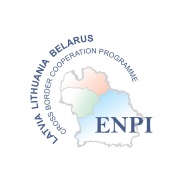E-MUSEUM “VITAMEMORIAE”: COLLECTION AND RESEARCH
Foto
To record people’s life stories, traditions, customs, rituals, rare photographs, old documents, ethnographic differences in funeral rites, etc. the researchers of Daugavpils University and Yanka Kupala Grodno State University carried out field studies in LV and BY territories: in the villages of Krāslava, Rēzekne, Daugavpils regions (Asūne, Foļvarka, Kruki, Skrudaliena, Indra, etc.) and in Belarus (Braslav and Vitebsk districts). The field studies were implemented in the framework of the project “Popularization of the Centres of Oral History in the LV – BY Cross-Border Area”, ID Nr. LLB–2–143, of the Cross Border Cooperation Programme Latvia–Lithuania–Belarus implemented within the framework of the European Neighbourhood and Partnership Instrument 2007–2013.
During the research and the expeditions, the project implementers collected, segmented, transcribed, and digitized the audio-visual materials (audio and video records, photo evidence). To make the collection of the E-Museum more complete, the field researchers and cemetery researchers of Daugavpils University and Grodno University will segment and systematize the audio-visual materials collected during oral history, cemetery research, folklore and dialectology expeditions of the previous years that until now have not been used, aiming at including the best and most valuable segments of the collection into the E-Museum.
The story tellers whose life stories make the input of the E-Museum are people of various generations, mostly elderly people. The childhood of aged people, who at present are about 80 years old, proceeded in the 1930s, therefore the segmented audio-visual units included in the E-Museum chronologically begin from 1929 and can describe only the respondents’ childhood memories. The memory of the older generation is particularly important for the anthropological and historical research – it shifts the time borders, allows for moving to the events of the past through the viewpoints of those who have experienced those times. The facts can be found in chronicles, but what the witnesses of that time can reveal give the memories colour, scent, involve one into mutual emotional experience. The witnesses of the epoch tell about the events form the viewpoint of their own experience.
To motivate the respondents to share their life stories, the project field researchers used Paul Thomson’s oral history research method – enlarged vision of social history where diverse groups of the society are brought together and share common historical experience.
The research basis is the methodology of a semi-structured interview that envisages focused (guided) reconstruction of the past events and an interviewer only helps the respondents to reconstruct the past.
The oral history collection of the E-Museum is envisaged to be used not only by specialists but also by a greatest possible range of non-specialists, therefore, departing from the academic tradition envisaging a complete script and transcript (written transcription of an audio or video record) of life stories, the project experts agreed to segment 360 most vivid, colourful, expressive, unusual, typological or extraordinary audio-visual units (photo, video and audio testimonies) – thematically complete excerpts, and to systematize them according to the thematic plan that would encompass both the historical processes of the 20th century (from the 1920s-30s) and the most essential events of an individual’s life.
ACCESSIBILITY OF THE COLLECTION
The interviews included into the collection are arranged according to the principle of historicism, anthropologism and personalia, indicating the author’s name and the interviewer’s name and surname.
-
And what could you tell me about Christmas and New Year celebrations?
And again, if we are talking about Soviet times, then considering Christmas, I’d say, being a child, I had never felt that the festival would have been prohibited. It simply was not. That was …
Researcher: Dr. philol. Valentīns Lukaševičs, Daugavpils Universitāte
Categories: Liga Seikste-Deksne
-
What could you tell me about the traditions of Līgo celebration [Midsummer night festivities]? What have you heard about Līgo, have you participated in Līgo celebration?
I have experienced Līgo celebration throughout my childhood – actually, the whole life. For me, Jāņi [Midsummer night festivities] is a significant and important holiday because my …
Researcher: Dr. philol. Valentīns Lukaševičs, Daugavpils Universitāte
Categories: Liga Seikste-Deksne
-
You gather medical plants now, don’t you?
Well, you see, when one lives in the country, to go and buy peppermint at the chemist’s would be ridiculous. Of course, I gather herbs for tea and not only for everyday cooking needs and to …
Researcher: Dr. philol. Valentīns Lukaševičs, Daugavpils Universitāte
Categories: Liga Seikste-Deksne
-
What is that lore of yours, but its roots actually are to be found in the previous generations of your family?
In this case, we should find out what the lore is. To some extent, the lore is a scale of human’s self-esteem that has established in the course of life. Thus, it develops in contact with the …
Researcher: Dr. philol. Valentīns Lukaševičs, Daugavpils Universitāte
Categories: Liga Seikste-Deksne
-
About the memory books
Very often, we set our past retroactively, but there are such witnesses of the past as memory books. Have you ever had such books at school and what you could say about it?
& …
Researcher: Dr. philol. Valentīns Lukaševičs, Daugavpils Universitāte
Categories: Liga Seikste-Deksne
-
The trees, bushes and flowers
Could you tell me what flowers and ornamental trees and bushes were grown on a Latgalian farmstead?
I can tell you only about the plants that grew in my home farmstead. Flowers and flower gardens …
Researcher: Dr. philol. Valentīns Lukaševičs, Daugavpils Universitāte
Categories: Eriks Zachs
-
Products in Latgale
In former times and, maybe, also nowadays, in Latgale people most often… buy a lot in shops, but they also grow a lot themselves. They cook themselves, too; therefore they have such self-grown …
Researcher: Dr. philol. Valentīns Lukaševičs, Daugavpils Universitāte
Categories: Eriks Zachs
-
What dishes were made on a farmstead?
On the farmstead where I used to live, dishes were usually made from those foodstuffs that were grown – from the garden, from the live-stock, those that we grew ourselves, as well as bought …
Researcher: Dr. philol. Valentīns Lukaševičs, Daugavpils Universitāte
Categories: Eriks Zachs
-
About the tapping birch sap
In Latgale, and maybe also in Latvia, there is such an unusual thing for the world as tapping birch sap and maple sap and their preservation – so that they could be used for consumption for, …
Researcher: Dr. philol. Valentīns Lukaševičs, Daugavpils Universitāte
Categories: Eriks Zachs
-
Have you happened to go, or see, experience going mumming? What do you know about mummers, going mumming?
Yes, about going mumming, that, of course, could be read about in various Latvian writers’ works – Jaunsudrabiņš’ or Birznieks-Upītis’, I won’t remember exactly, …
Researcher: Dr. philol. Valentīns Lukaševičs, Daugavpils Universitāte
Categories: Eriks Zachs


